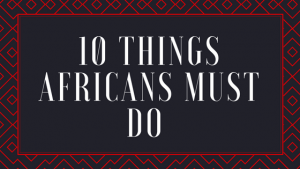- October 30, 2017
- Posted by: administrator
- Category: blog, Economics, International

It is an undeniable fact that Africa lags far behind the rest of the world in virtually all areas of economic and human development. This impacts negatively on the quality of the lives of its people and on the continent’s ability to influence issues that affect the world. Africa has to take a serious look at itself and come out with the answers to set it on a course that will enable it to break the cycle of underdevelopment, poverty, corruption and poor governance. Here are just a few areas which need to be addressed to set the continent on the right path.
1. Institutions in Africa are weak with the result that leaders have the scope to impose their will on nations – the so-called Big Man syndrome. Strong institutions are the bulwark of modern democratic nations as they act as a powerful countervailing force against autocratic and capricious rule.
2. This also applies to transnational institutions that are supposed to drive regional development and integration. For regional bodies such as SADC, ECOWAS and EAC to succeed, member states must accept that some of their sovereignty has to be ceded to regional institutions to enable them to execute their mandates. Currently, regional bodies are run by weak secretariats whose leaders are treated like second rate civil servants.
3. The same situation exists at the level of the AU itself. The power and influence of the AU Commissioner and the bureaucracy they preside over are limited, as member states show a reluctance to empower the continental body’s institutions.
4. Efforts to develop through regional cooperation and integration are further undermined by a huge dependence on external donor funding. Africa’s inability to find viable funding models for the AU and its regional bodies is a major weakness that must be addressed if meaningful progress is to be made.
5. There was a glimmer of hope over a decade ago when leaders such as South Africa’s Thabo Mbeki, Nigeria’s Olusegun Obasanjo and Abdoulaye Wade of Senegal became passionate advocates of an African Renaissance.
6. To translate the vision of an African Renaissance into reality, initiatives such as the African Peer Review Mechanism and the establishment of an African Parliament were taken. Sadly this vision is now dead in the water, largely to a lack of commitment from the majority of leaders whose priority is to have unfettered power in their personal fiefdoms.
7. As a result of the above observation, there is a return in a number of important African countries to old habits of increased political repression, rigged elections, self-serving constitutional amendments to prolong the rule of entrenched elites, and a general undermining of the rule of law.
8. There are pockets of real progress but these are offset by a general stubborn reluctance by most African governments to empower their own people and institutions. There is also an unwillingness to capacitate transnational institutions created to accelerate the pace of regional cooperation and integration. The most unfortunate result of this state of affairs is economic stagnation and regression.
9. There must be an acceptance by African leaders that the continent is in bad shape and is far behind the rest of the world. The continent has to carry out a brutally frank assessment of the impediments to its economic growth and progress in many other areas.
10. A head of state and government summit must be held to focus on the general state of the continent and solutions found. The old habit of placing brotherhood and friendship above all else has not served Africa. It has encouraged uncomfortable issues to be swept under the carpet to the detriment of the African people. African leaders must step out of their comfort zones and provide the bold and progressive leadership required to lift the continent out of its desperate position as the laggard of the world.
#Resilience – no stopping us now!
